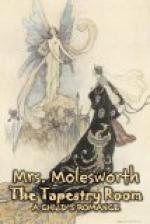CHAPTER I.
Mademoiselle Jeanne.
“Maitre Corbeau, sur
un arbre perche.”
La Fontaine.
It was so cold. Ah, so very cold! So thought the old raven as he hobbled up and down the terrace walk at the back of the house—the walk that was so pleasant in summer, with its pretty view of the lower garden, gay with the bright, stiffly-arranged flowerbeds, so pleasantly warm and yet shady with the old trees overhead, where the raven’s second cousins, the rooks, managed their affairs, not without a good deal of chatter about it, it must be confessed. “Silly creatures,” the raven was in the habit of calling them with contempt—all to himself, of course, for no one understood the different tones of his croaking, even though he was a French raven and had received the best of educations. But to-day he was too depressed in spirit by the cold to think of his relations or their behaviour at all. He just hopped or hobbled—I hardly know which you would call it—slowly and solemnly up and down the long walk, where the snow lay so thick that at each hop it came ever so far up his black claws, which annoyed him very much, I assure you, and made him wish more than ever that summer was back again.
Poor old fellow! he was not usually of a discontented disposition; but to-day, it must be allowed, he was in the right about the cold. It was very cold.
Several others beside the raven were thinking so—the three chickens who lived in a queer little house in one corner of the yard thought so, and huddled the closer together, as they settled themselves for the night. For though it was only half-past three in the afternoon, they thought it was no use sitting up any longer on such a make-believe of a day, when not the least little ray of sunshine had succeeded in creeping through the leaden-grey sky. And the tortoise would have thought so too if he could, but he was too sleepy to think at all, as he “cruddled” himself into his shell in the corner of the laurel hedge, and dreamt of the nice hot days that were past.
And upstairs, inside the old house, somebody else was thinking so too—a little somebody who seemed to be doing her best to make herself, particularly her nose, colder still, for she was pressing it hard on to the icy window-pane and staring out on to the deserted, snow-covered garden, and thinking how cold it was, and wishing it was summer time again, and fancying how it would feel to be a raven like old “Dudu,” all at once, in the mixed-up, dancing-about way that “thinking” was generally done in the funny little brain of Mademoiselle Jeanne.
Inside the room it was getting dark, and the white snow outside seemed to make it darker.
“Mademoiselle Jeanne,” said a voice belonging to a servant who just then opened the door; “Mademoiselle Jeanne, what are you doing at the window? You will catch cold.”




